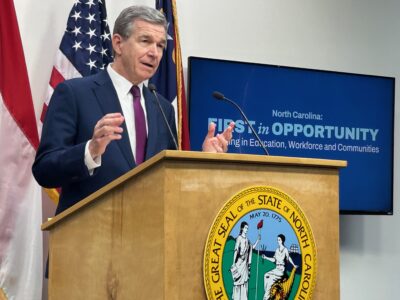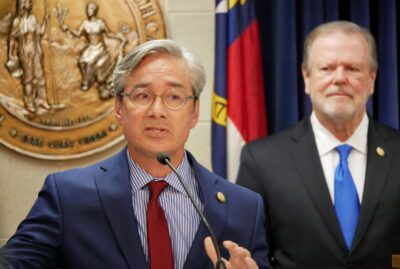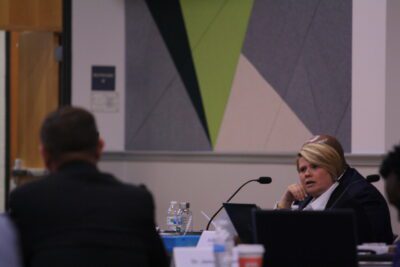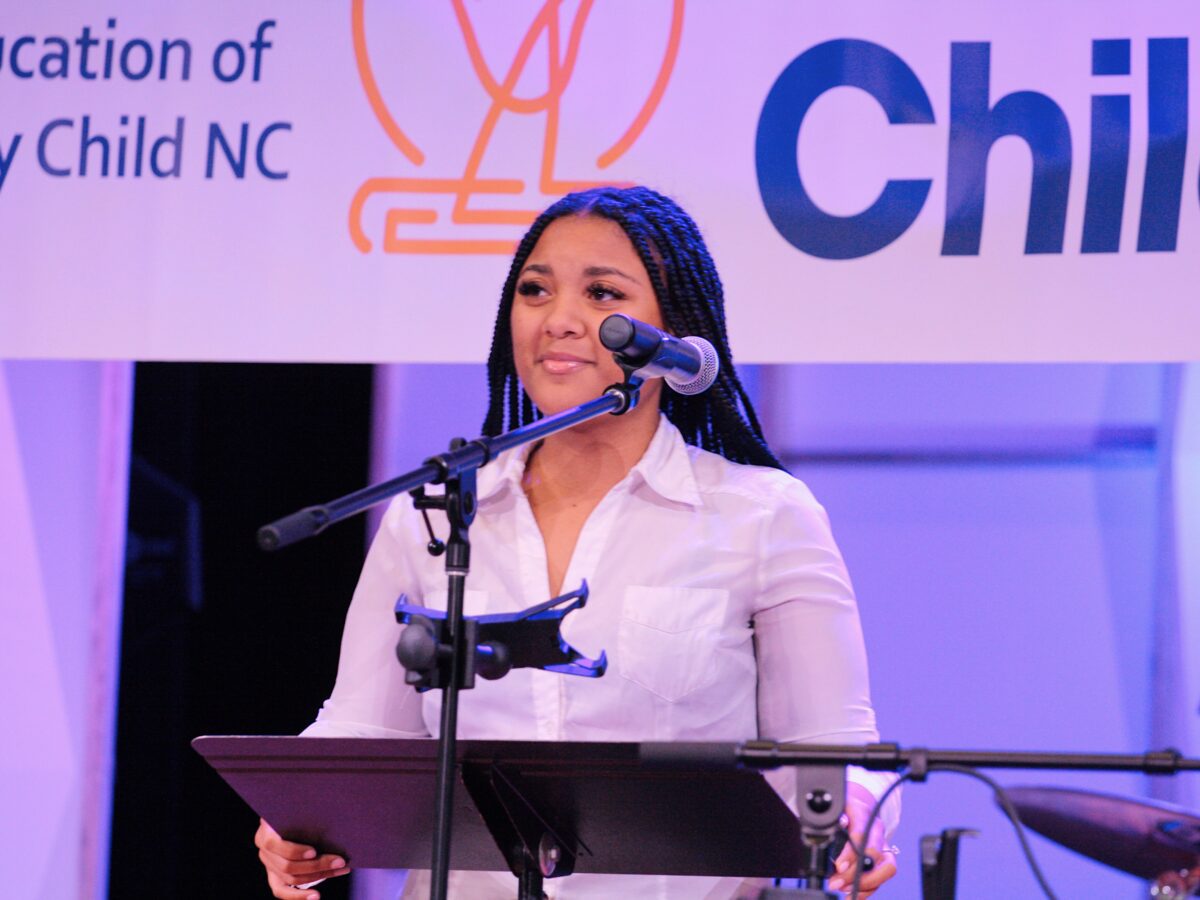
Share this story
- Every Child NC's "Opportunity for Every Child" rally was held in response to the Republican-led legislative efforts to expand private school vouchers this long session. Speakers spoke about the importance of funding quality and equitable public education.
- “The many accomplishments and achievements I have would not be possible without public schools,” one student speaker said. “The money that is being poured into private schools should be poured into our public schools.”
|
|
When Mariah Manley graduated from Cumberland International Early College High School in May 2022, she did so with accolades.
At age 10, she became fluent in Spanish through a Spanish immersion program at her public elementary school. She learned to play her first instrument – the viola – in fifth grade, joined her middle school chorus, and learned to play chess at age 12. In high school, she played varsity women’s soccer and golf, served as senior class president, and graduated valedictorian of her class.
Now a honors student at UNC-Charlotte, Manley credits her many successes to the public schools she attended.
“The many accomplishments and achievements I have would not be possible without public schools,” Manley, a research intern for Public Schools First NC, told attendees at Every Child NC’s “Opportunity for Every Child” rally on Wednesday.
Manley was one of more than a dozen speakers at the rally, held in response to the Republican-led legislative efforts to expand private school vouchers in North Carolina this long session.
“Our public schools provide equity with race, ethnicity, economic background, disability, sexual orientation and language,” she said. “The money that is being poured into private schools should be poured into our public schools.”
The rally, held on Wednesday at Edenton Street United Methodist Church in Raleigh, was also supported by nonprofits Book Harvest and Pastors for NC Children. Event sponsors provided free books in Spanish and English, interpretation services, a crafting and face paint station, along with a free breakfast and lunch.
Students like Manley, educators, and advocacy leaders alike spoke about the importance of funding quality and equitable public education.
North Carolina Association of Educators (NCAE) President Tamika Walker Kelly spoke about the “critical need to fully fund our public schools and provide the resources that our professionals and our students need to succeed.”
“I am so thrilled to see such a beautiful representation of North Carolina here in this room today,” Walker Kelly said. “And thrilled to know that you all are here to show your support for our students and our public school professionals as we fight for a budget that puts public education first.”
The Republican-led Senate released its budget proposal last month, prioritizing school choice expansion.
The budget would add more in recurring funding to expand private school vouchers through the Opportunity Scholarship Grant Program over the biennium than it would add to implementing its proposed teacher salary schedule, by about $27 million.
With the additional allocations, the Senate’s revised net appropriation for the Opportunity Scholarship Grant Reserve is $636 million over the next two years. The budget also proposes an additional $11 million to fund additional vouchers in 2023-24 and removes all income eligibility requirements for recipients, starting with the 2024-25 school year.
On Wednesday, Walker Kelly said such a proposal will remove money from our public schools, while primarily giving vouchers to families who can already afford private schools.
Public schools are the foundation of our democracy, she added, noting that Republicans are passing legislation to change state election laws at the same time as they are expanding vouchers.
“Public education is a constitutional right. Most importantly, it is also a moral obligation,” she said. “We must speak up and make sure that our lawmakers know that we don’t want two separate and unequal systems. We want one strong public system.”
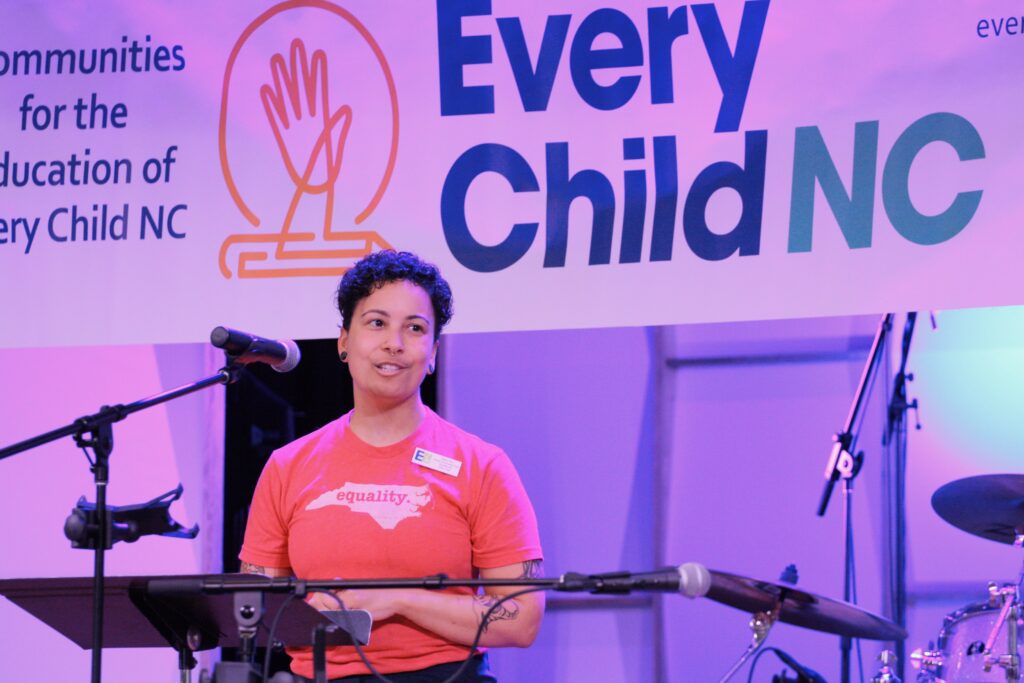
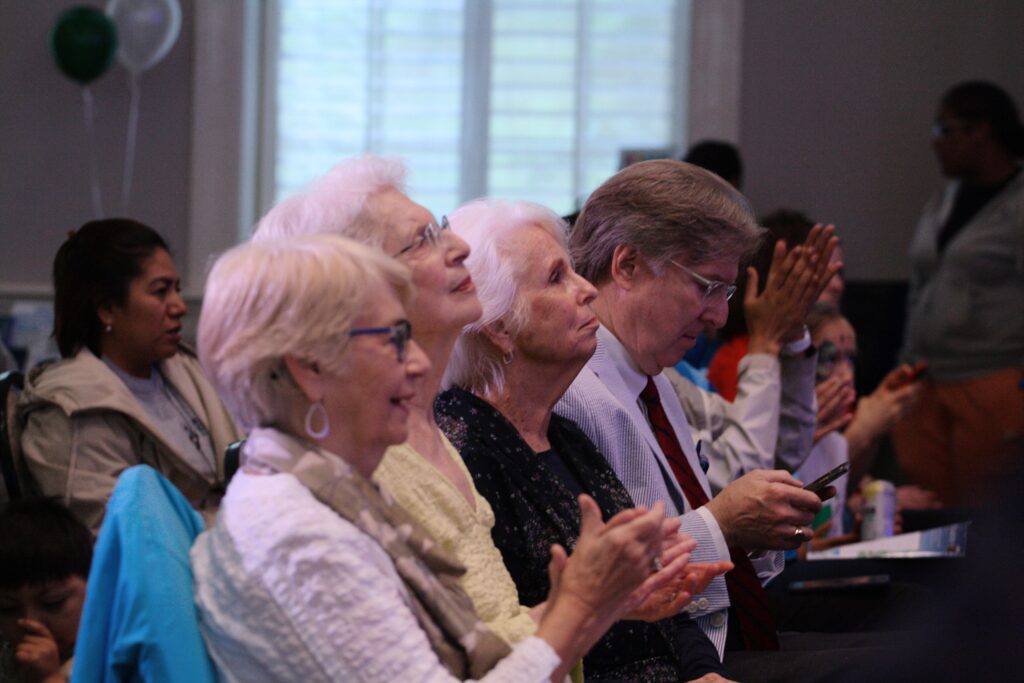
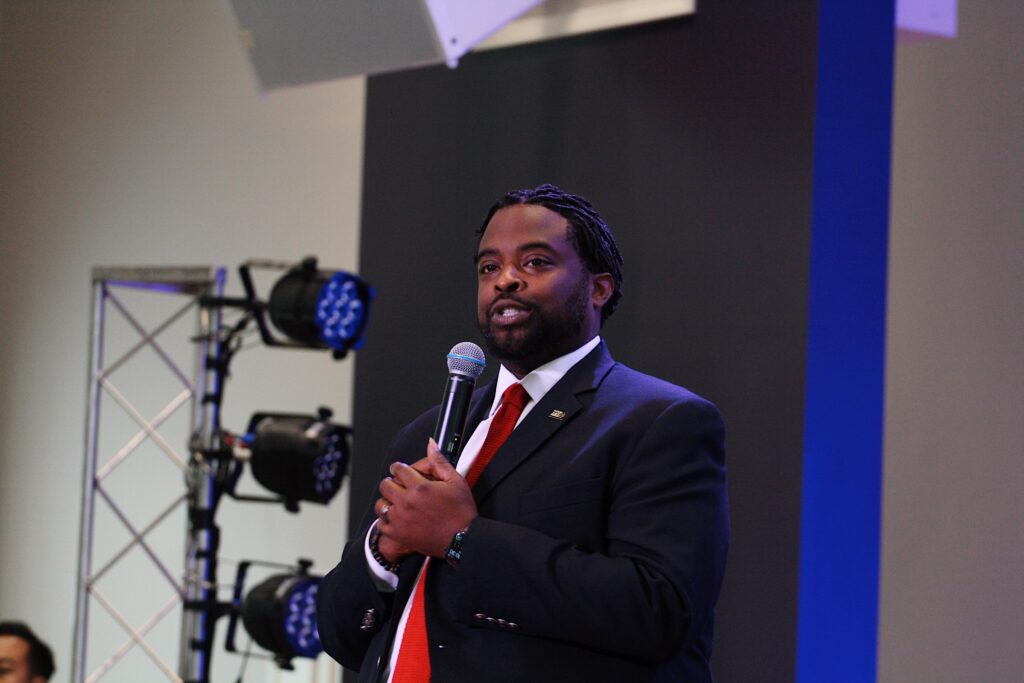
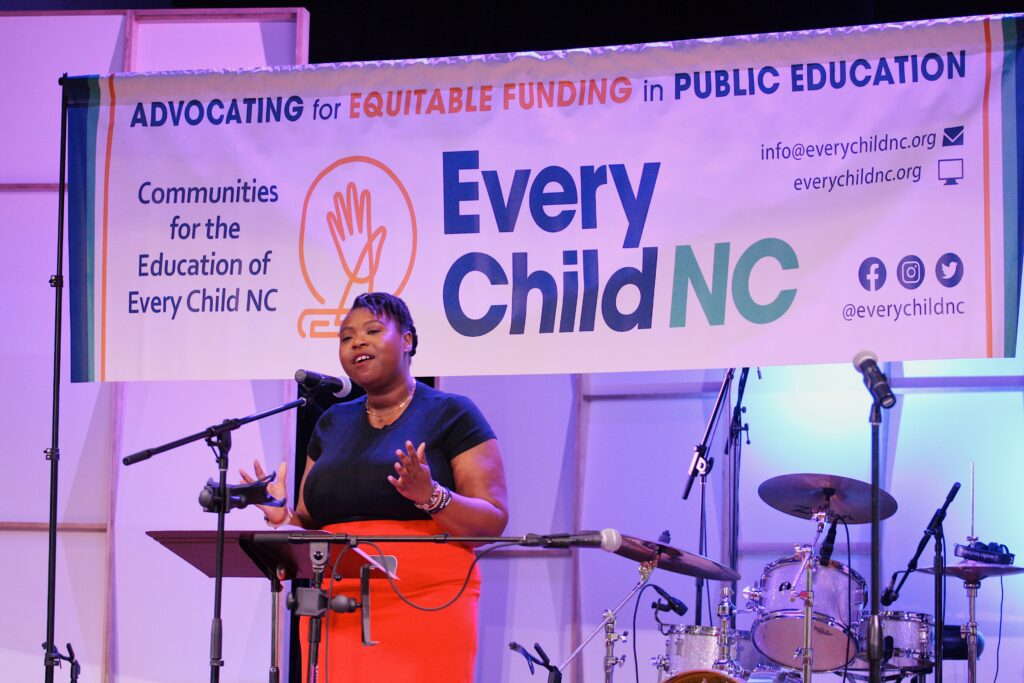
Concerns over voucher expansion
A fiscal note from the Office of State Budget and Management (OSBM) published last month said the budget’s proposal would decrease total state funding for public schools by $203.8 million if 50% of new voucher recipients previously attended public school. The note included 5-8% decreases in state funding in some rural counties.
Earlier this month, the N.C. Department of Public Instruction (DPI) said they don’t expect to see a significant impact in the immediate future, based on what has happened in other states and the capacity of private schools to enroll additional students.
State Superintendent Catherine Truitt said it is most likely that the expanded vouchers would be used by families already in private schools.
“What we’re saying is that there are not enough places in private schools for new families to leave their public schools and avail themselves of private schools,” she said.
There is no way to predict if private schools will build capacity in order to accept more students.
On Wednesday, rally speakers said either option is bad for public schools. Either the money goes to families who don’t need it, or the loss of students transferring to private schools threatens the baseline costs it takes to operate a school well.

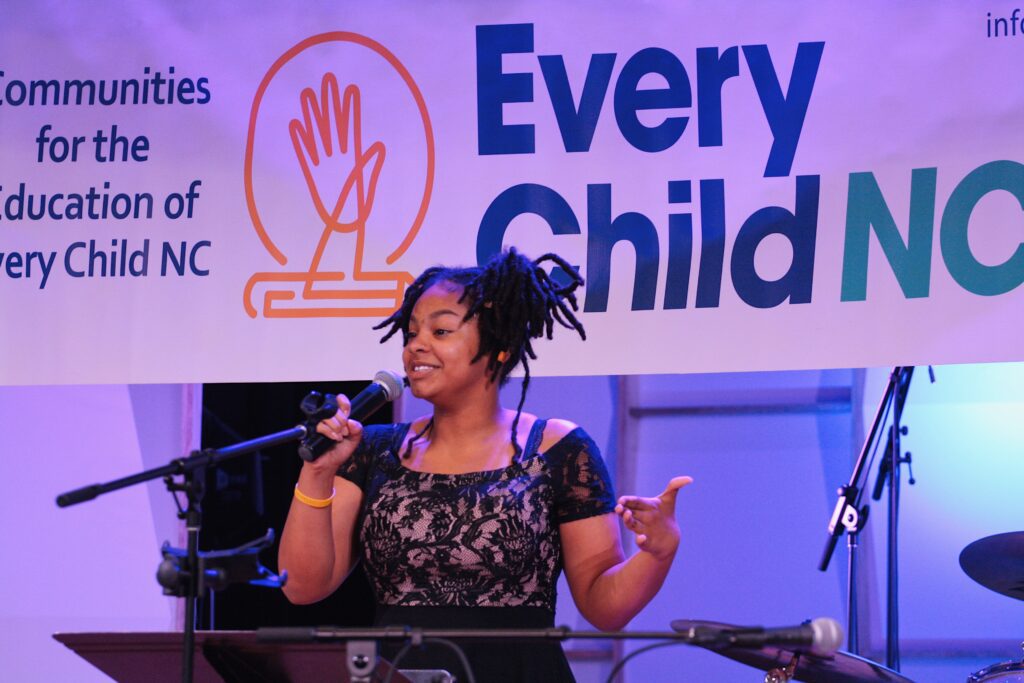
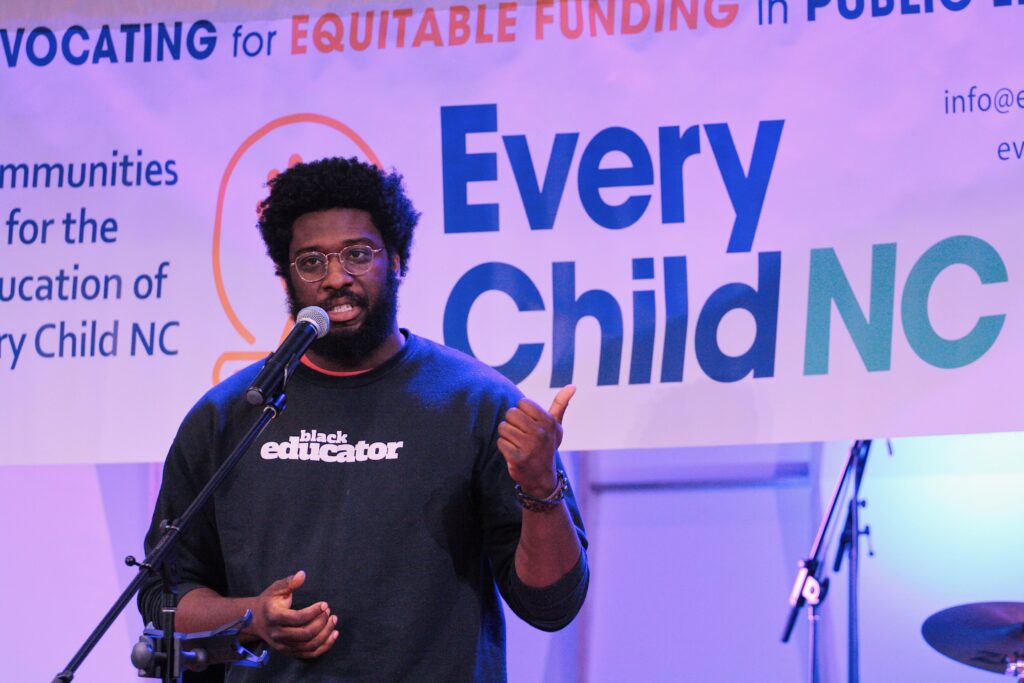
Speakers also highlighted the issue of accountability for private schools, who don’t have the same testing requirements as public schools. Several speakers also cited new analysis from the N.C. Justice Center showing 62 instances of N.C. private schools having more vouchers than students.
“What is clear is that there is inadequate oversight of the Opportunity Scholarship voucher program,” that report says. “These issues will only get worse if lawmakers triple the program’s size. Lawmakers need to pause their expansion plans until they can figure out what’s going on.”
Multiple speakers on Wednesday also said the state must fully fund the Leandro Comprehensive Remedial Plan – including Angus Thompson, one of the original plaintiffs in the case from Robeson County.
Twenty-nine years later, he is still fighting to ensure the state’s children get a sound, basic education, he said.
“Folks, the fight goes on. And what we’re going to have to do, we’re gonna protest, for those who know the words of prayer, we’re gonna pray, and we’re gonna vote,” Thompson said. “Be encouraged. As bad as it is, we’re gonna win.”
The Leandro case began nearly 30 years ago when families from five low-wealth counties sued the state, establishing the state constitutional right to access a sound, basic education.
Neither the House nor the Senate budget plan explicitly mentions funding Leandro. The General Assembly’s current shortfall for Years 2 and 3 of the Leandro Plan is $678 million, per an April court order.
On Wednesday, rally speakers pointed out that amount is less than the Senate budget’s expansion of vouchers over the biennium.
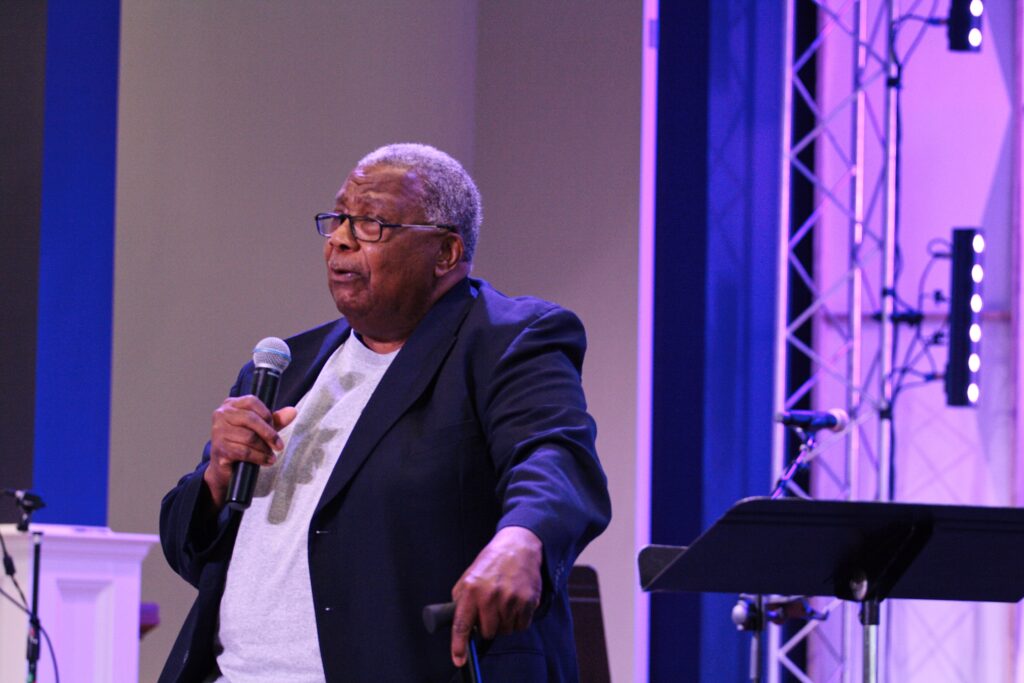
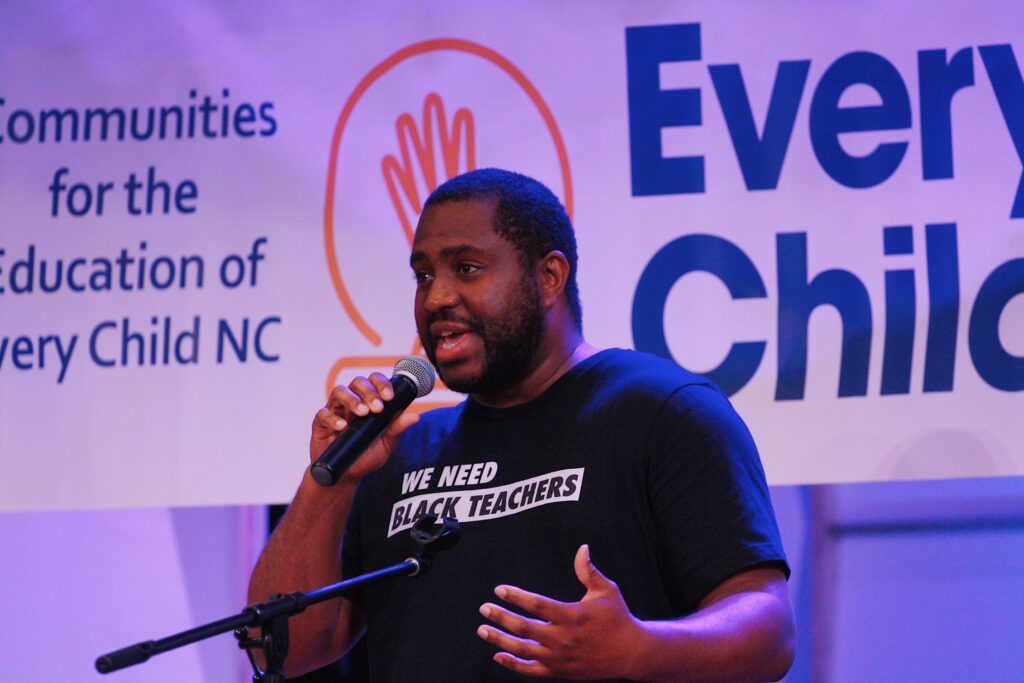
Jerry Wilson, director of policy and advocacy at the Center for Racial Equity in Education (CREED), said the majority of North Carolinians don’t support the expansion, citing a recent poll by CREED.
“The majority of people actually support robust, fully funded, honest, equitable, safe education in North Carolina,” said Todd Warren, with HEAL Together N.C. & Public School Strong. “We’re the majority, but we’ve got to be organized. And we have to make our voices heard.”
He added, “we are really going to need our school boards and superintendents to be brave.”
Warren gave appreciation for the governor’s declaration of a state of emergency for public education, along with the 16 school districts who have released statements asking lawmakers to prioritize public education in the biennium budget.
In addition to having less testing accountability than public schools, speakers also highlighted that private schools don’t have to serve students with disabilities or LGBTQ+ students.
Rebby Kern, director of education policy at Equality NC, highlighted additional legislation concerning LBGTQ+ students.
“The attack on funding in schools as well as the censorship that we’re seeing across race, gender identity, and sexual orientation is all coming together to try to tell us that we’re wrong – but we are not,” they said. “We are here, this is our space, and we’re going to continue showing up.”
Student Mariah Manley pointed out that private schools are not required to provide free-and-reduced lunch or transportation – making it difficult for many low-income students to consider attending, even if they could afford the remaining tuition balance after a voucher.
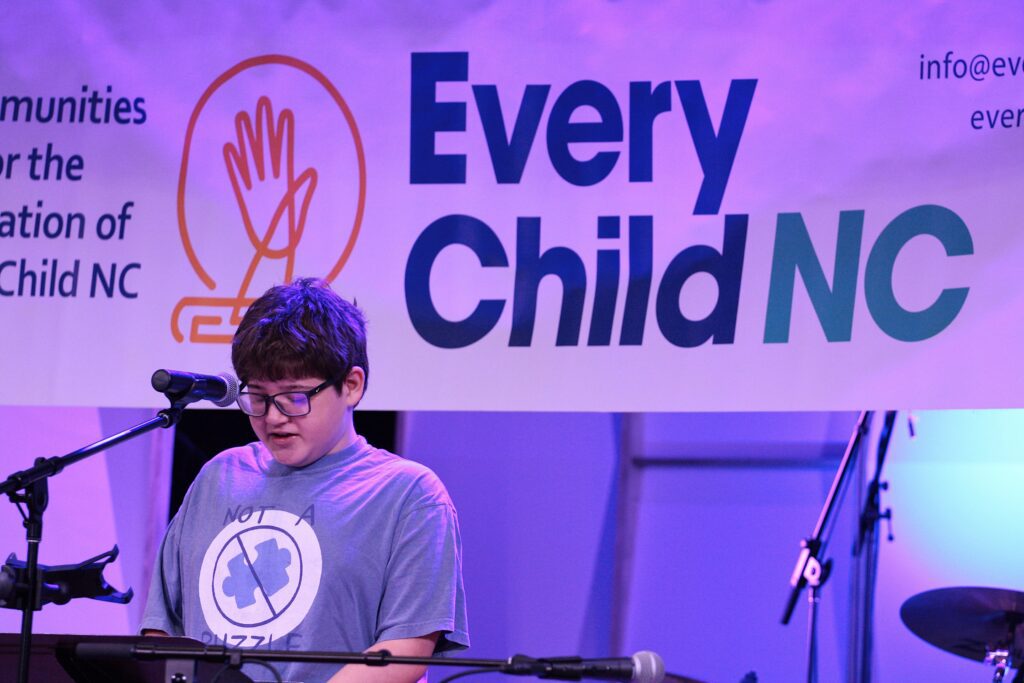
Emerson Pope, a student at Reedy Creek Middle School in Wake County, is autistic. On Wednesday, he spoke about the crucial services he’s received from his public schools, like speech therapy and one-on-one aid.
“When you fund our public schools you get more resources for more people,” he said. “Having a certified, well-trained teacher makes my life better. By the way, only public schools give us all these services.”
Another student, Amirra “Butterfly” Crews, said public education helps more people reach their goals. A rising eleventh grader and honors student at R.J. Reynolds High School in Winston-Salem, Crews said she wants to attend college to be a sign language interpreter and veterinarian.
“We need more resources,” she said. “It’s important for the government to fund public schools so that way kids can go to school without having to pay thousands of dollars. This lets kids have their own experience with society and finding their own self and sense of identity.”
Danielle Caldwell, early childhood advocate and provider, charged attendees at the end of the rally with knowing, and contacting, their elected officials.
“When you want to get rid of something, what do you do? You defund it. So we have to get organized,” she said. “Education is the equalizing factor for economic mobility.”
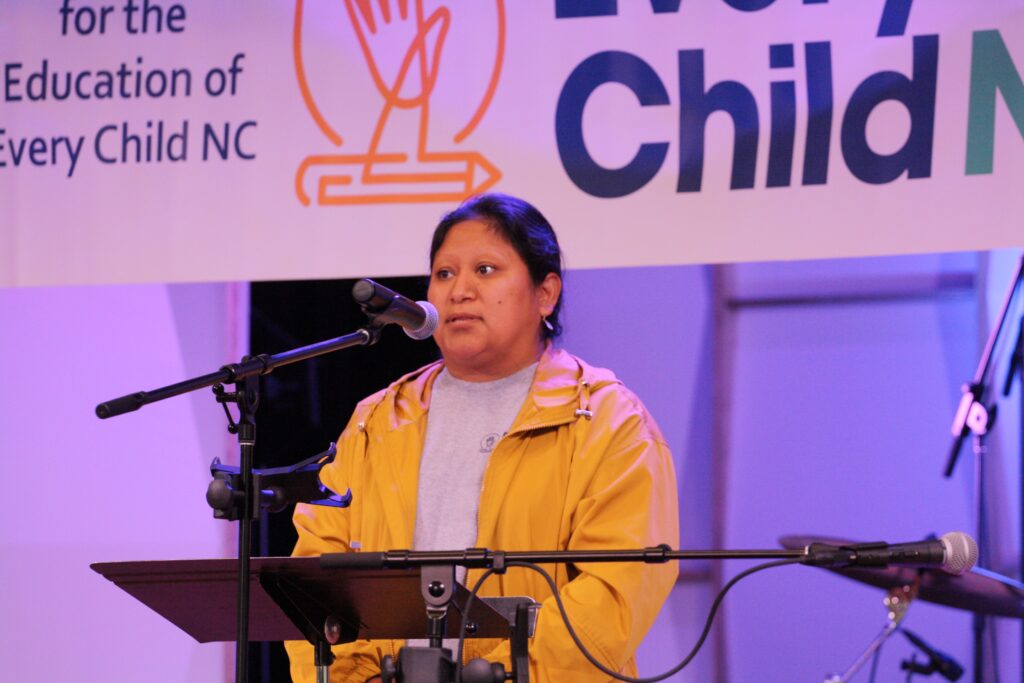
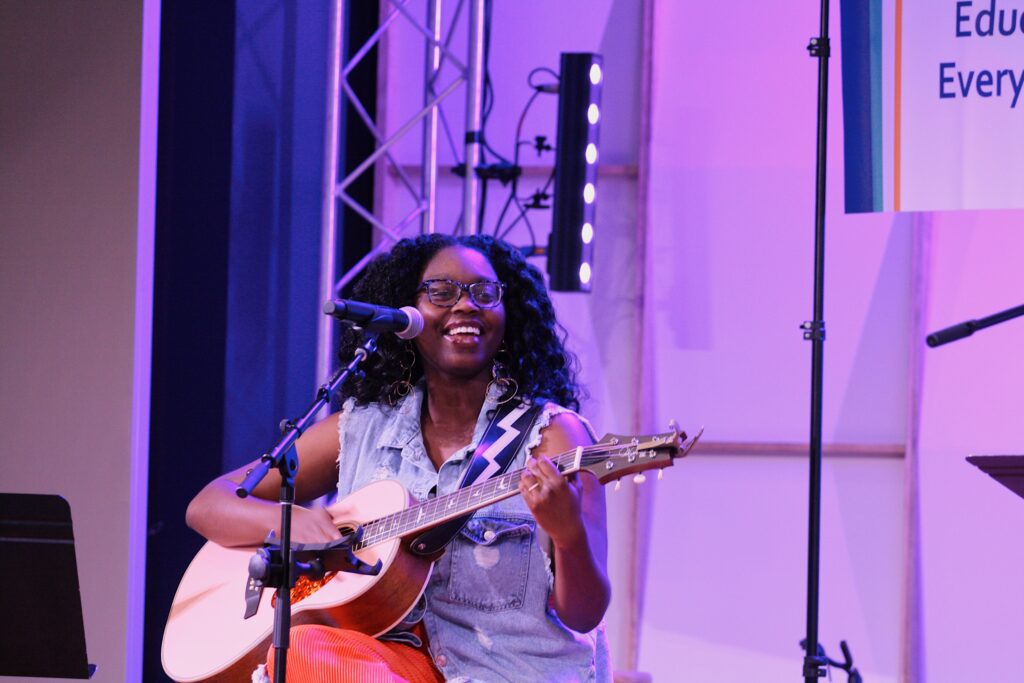
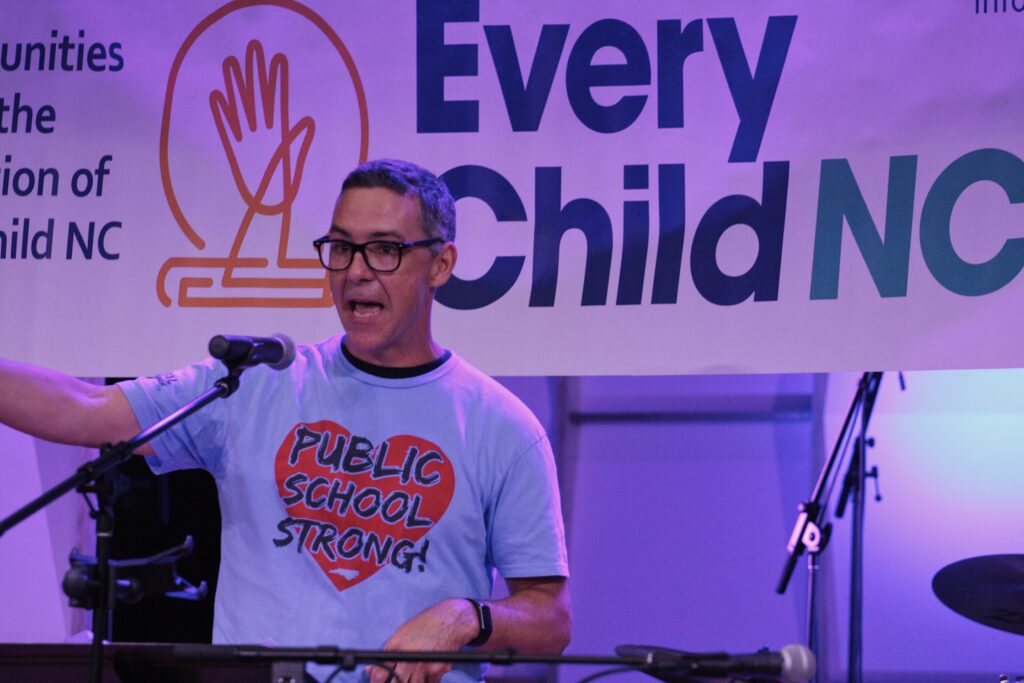
Other education legislation
Meanwhile, a couple blocks away, the House Education Committee passed favorable reports on proposed committee substitutes for three bills, including Senate Bill 49, the “Parents’ Bill of Rights.”
Opponents say the bills will create chilling effects for educators, regarding the bill’s limiting on instruction of “gender identity, sexual activity, or sexuality.” Others say that it is dangerous for LGBTQ+ kids and will damage educators’ relationships with students.
The bill must now go to the House rules committee. Committee co-chair Rep. Tricia Cotham, R-Mecklenburg, held the vote without allowing public comment, citing a lack of time.
Rep. Marcia Morey, D-Durham, asked whether this bill applies to private schools. Galey said it would not, adding, “I don’t think we want the state to assert its jurisdiction over a private organization.”
Bill-sponsor Amy Galey, R-Alamance said if parents are dissatisfied with the actions of their child’s private school, they can simply leave.
“The problem is, we’re also giving private schools taxpayer money in Opportunity Scholarships,” Morey said. “And we’re saying public schools have to have incredible burdens – of reporting, of not reporting, of how we deal with children who have questions, of textbook protests, opt-outs – I mean, when their job is teaching.”
Morey noted that the funding proposed to go private schools through vouchers have very few educational mandates.
“But we’re burdening the public schools, taking away principals and teachers from the job of teaching, to make sure they’re following all these administrative responsibilities,” she said.
Rep. Julie von Haefen, D-Wake, asked about the impact of one section of the bill that requires parental notification. That section also encourages schools to facilitate discussions with parents when students request or need certain health care.
Von Haefen raised the example of a child who is abused or neglected at home. Galey responded that the bill provides an exception and reiterates current law that mandates schools to report such cases.
“I think that the bill really does not address how abuse actually is identified by teachers and school personnel in schools,” von Haefen said. “Abused children do not typically go to a teacher or counselor and just say, ‘I’m being abused.’”
Instead, von Haefen said, teachers have to develop a relationship and trust with such students. Teachers and staff must also receive training in how to identify children who might be abused or neglected, she said.
“And I think that this bill really ignores the reality of what goes on in schools when it comes to how children go to their teachers, how do they go to their counselors, and express that they are having issues,” she said. “Whether it’s at home, whether it’s with their peers.”
SB 49 is one of more than 100 education-related bills that made the May 4 crossover deadline, meaning those bills passed at least one chamber in the General Assembly by then. You can view EdNC’s report on those bills here.
Correction: Rep. Julie von Haefen’s last name was previously misspelled. The article has been updated to include the correct spelling.
Behind the Story
EdNC Reporter Rupen Fofaria contributed reporting to this story.



